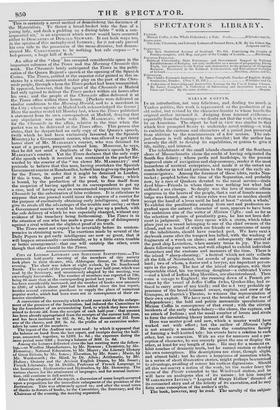MIRIAM COFFIN.
IN an introduction, not very felicitous, and: dealing too much in Yankee politics, this work is represented as the production of an old sailor, but revised by the character-hunter to whose hands the original author intrusted it. Judging from internal evidence— especially from the leanings—we doubt not that the work is written
by an American. The object he had in view was similar to that which first prompted Scorr to undertake novel-writing—a wish to embalm the customs and characters of a period just preserved from oblivion by the reminiscences of a few seniors. The sub- ject chosen is well adapted to the novelist ; but the author has scarcely the skill to develop its capabilities, or genius to give it life, reality, and interest.
The inhabitants of the small islands clustered off the Southern shore of Massachusetts claim the credit of having originated the South Sea fishery ; whose perils and hardships, in the present improved state of navigation and ship economy, render it the most hazardous of nautical enterprises, and made it at the outset not much inferior in toil and privation to the voyages of the early cir- cumnavigators. Among the foremost of these islets, ranks Nan. tucket ; peopled before the time of the Separation, and probably now, by a race of Quakers devoted to the naval service—drabs dyed blue—Friends in whom there was nothing but what had suffered a sea change. So deeply was the love of marine affairs
engraver in the hearts of the people, that a sort of female masonic lodge was formed, one of whose rules was that no maiden should accept the hand of a lover until he had at least " struck a whale." To exhibit the peculiarities arising from sect and profession en- grafted upon the natural character of man, appears to have been the ambitious aim of the writer of Miriam C9ffin : and as far as the selection of points of peculiarity goes, he has not been defi- cient in judgment. The story opens with a storm, which takes place just as a vessel belonging to one of the chief owners of the island, and on board of which are friends or connexions of many of the inhabitants, should have reached port. We have next a daybreak scene after the tempest has lulled, with the washing of fragments of a wreck on shore; and subsequently the arrival of the good ship Leviathan, when anxiety turns to joy. The inci- dents following are various, and well adapted to exhibit individual characters and the customs and manners of the time. There is the island " sheep-shearing; " a festival which not only collects all the folk of Nantucket, 15but crowds of people from the main- land ; two of whom, a doctor and a lawyer, are important person- ages in the piece. The last of the island aborigines, with their respectable chief, his too trusting daughter—a cultivated Yarico —and a kind of Indian Meg Merrilies, are also introduced. Then come a voyage to England; the running down of a French pri- vateer by the vessel of Jeffro Coffin (who, Quaker-like, had re- fused to carry arms of any kind); and the nut very probable ap- pearance of the broad-brimmed owner, captain, and crew of the Grampus, at Garrick's Theatre, to witness the representation of their own exploit. We have next the breaking out of the war of Independence ; the bold and politic mercantile speculations of Miriam Coffin in consequence of that event ; with the stirring incidents of the early whale-fishery—the chace, the capture, and an attack of Indians ; and the usual number of lovers and rivals. to form the circulating library interest of the novel. Here was matter good and new, which a master would have worked out with effect ; but the author of Miriam Coffin is not exactly a master. He wants the constructive faculty of forming a well-knitted tale: his events have a relation to each other, but no connexion. With an eye for manners and a per- ception of character, lie can scarcely paint the one or display the other, at least for any length of time. Ile may for a moment ex hibit touches of dramatic truth, but he cannot sustain or develop his own conceptions. His descriptions are clear, though slight, and almost bald ; but he shows a happiness of narration which, in a series of short illustrative stories, might perhaps beexercised to advantage, avoiding of course his endless digressions. Should all this not convey a notion of the work, let the reader fancy the scene of the Pirate extended to the Windward station, and he will have an analogous idea of its nature : let him imagine WASHINGTON IRVING'S " Legend of Sleepy Hollow" divested of its connected story and of the felicity of its execution, and he may form some conception of the author's style.
The book, however, may be read. The novelty of the subject-
















 Previous page
Previous page